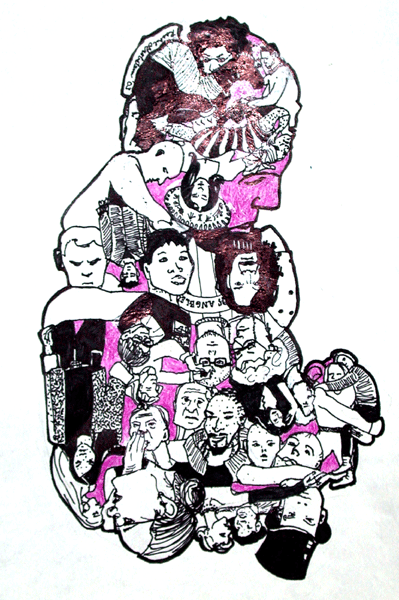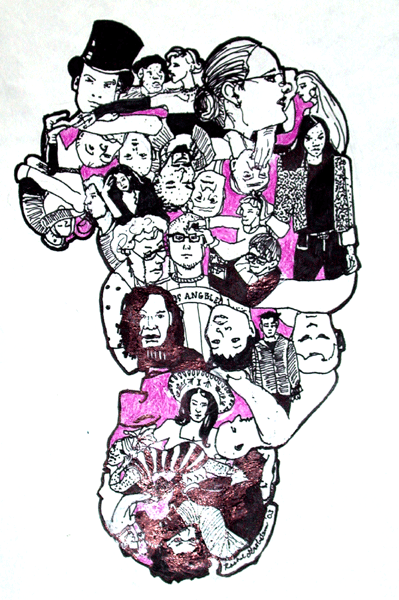Made available on Serendip
In association with Making Sense of Diversity: An Exploration, a world wide conversation

|
March 3, 2006
Stephanie Bell
Exploring Issues of Disability and Access
Participants
Summary
Prepared by Vanessa Christman
Additions, revisions, extensions are encouraged
in the On-Line Forum
| 
|
Stephanie Bell, Director of Access Services, and Klaudia Gorska, President of the student group Advocates for Disability Awareness (ADA), facilitated the discussion. They began by showing a movie in which the world has been turned upside down: the main character is not disabled, but everyone else is. In the face of this oddly “normal” person, people reacted in a variety of rather awful ways, from the maitre d' whose pained politeness soon turned to snootiness to sympathetic observers who whispered about the person's lack of disabilities as he walked by.
Viewers at the MCC felt that the idea of the odd one out created an interesting dynamic. They acknowledged and questioned the filmmakers' choice to have almost exclusively characters with disabilities that were clearly visible. “How would you know if someone were disabled or not, just because they don't look disabled? There are lots of hidden medical conditions, for example. There are hidden disabilities.” The group did note that deafness was represented and approximated with muffled sounds in one of the scenes.
The film's representation of an entire world of disabled people underscored the notion of a culture of ability and disability. The main character was “normal” but was left out because the environment was for the disabled. This aspect was noted in a scene in which the room was full of people using wheelchairs, and there was no place for the main character to sit down (no seats being needed if all the others have wheelchairs). Also, though his deaf neighbors might have been able to help him, he could not be helped by them since he didn't sign.
How does all this play out at Bryn Mawr?
A resolution presented at plenary to renovate Denbigh for disability access did not pass quickly, whereas an environmental resolution passed quickly. Although all that was being sought was student support, the presenters were grilled with many questions about their resolution. Why? Do we, at BMC, overanalyze everything? It was noted that language became a bit of an issue too, with students referring to people with disabilities as “those people.”
Someone theorized that since it is no longer PC to say—or think— “we owe handicapped people something,” that there is an added discomfort in how to refer to people with disabilities. It's the same as thinking about another minority group as the Other, instead of being inclusive.
In the video disabilities were very apparent, but in the real world that's hardly the case. How about depression, for example? That's not easy to see.
What does it mean to be in an academic setting, where issues of disability are not about ramps only, but about things like not being able to write easily?
Stephanie pointed out that the largest subgroup at any college is the group with learning disabilities or ADD.
In a small college like Bryn Mawr, while there may be a small number of students who have physical disabilities, they still need accommodations. So it's not about numbers—it can't be.
The issue of fairness was examined. Students have been known to comment, “It isn't fair that you get to type. It isn't fair that you get closer room draws.” Fairness, someone replied, is not about treating everyone the same. Someone else was surprised that BMC students have not had to grapple with issues of disability before.
The notion of competition was raised—that someone with accommodations could be seen as a threat. In such a closed system—in a world of timed tests and grades and applications, it only bothers someone that accommodations are made because the person doesn't have the same advantages. We need to address this issue. We CANNOT assume that the playing field is leveled. Instead of ”it's not fair,” it's better to think “it's not the same.”
So, how do we respond on this campus? A professor who said she likes her classes to have a quick give-and-take, whose classes are very verbal, asked, “How do I deal with that if a deaf student enrolls? If hearing impaired people enroll in the class? Do I give up that pedagogy?”
And how do we respond to mental illness? What if someone has multiple disabilities? Mental illness and blindness, for example. Depending on one's situation, are appropriate resources available? And can one handicap lead to another (physical to mental)?
On our campus, we invite all sorts of individuals to seek services, but people may have a fear of stigma around mental illness. . . .also, it's a condition that sometimes MAKES it difficult to reach out for help. It's a matter of climate, culture and politics.
How do people go about making a connection with people they are not particularly comfortable with? In the video, someone shared, “I have a cousin without a disability.” The way she did it was insensitive, but although there are better ways, she was reaching out. It's important to move outside our comfort zones. How do we do that? (In the video the main character and his date both had a drink before being able to go out on the dance floor together (!))
Someone proposed that when you're part of a particular group, you know even the best-intentioned people are going to struggle with how to communicate. We hope people in a group can distinguish between someone looking to reach out and someone whose mouth is moving, but their brain (and heart?) is not functioning. “I think I have developed that level of sensitivity,” this person said.
Another person said that it has been important for her to know, to think, “maybe this person is not totally comfortable with this.” They're not necessarily a jerk.
Equity—vs.—fairness. That's another way of looking at the situation. But, more than seeking equity is learning to value difference! How do we sensitize people? It's not just about sitting down with a book, or having an experience. Is the burden still on the people who know the most about a situation?
When the founders of the ADA organization were asked what they are seeing on campus, Klaudia and Emily Lewis explained that they started the club because disability awareness was not an issue at BMC and it should be. Klaudia wants to focus on raising awareness with the student body.
Stephanie commended one of the participating professors for her willingness to avoid saying, “You don't belong here,” but rather to say, “You're here, so what do I need to do to make [instruction] accessible?” The goal is not to think about individual students only, but to make Bryn Mawr universally accessible. Openness and willingness are to be commended in pursuing this goal.
What does the immediate future hold? Klaudia and Stephanie urged people to e-mail them with future discussion topics related to disability. It was suggested that people think about a presentation at a faculty meeting.
Stephanie invited anyone who's interested in discussing access issues, either from a personal perspective or more generally, to feel free to contact her at x7351 or sbell@brynmawr.edu . The Access Services web pages are also a good resource: http://www.brynmawr.edu/access _services .
| Return to Schedule for Friday Noon Conversations

| Bryn Mawr Conversations
| Archived
Forum
| Archive of Bryn Mawr Conversation
| General Conversation
| Serendip Home |
These pages are sponsored by the Bryn Mawr College Office
of Intercultural Affairs, the Center for Science and Society and the Serendip
website. Send us additional comments or suggestions at Serendip
© by Serendip 1994-
- Last Modified:
Wednesday, 21-June-2005 15:18:00 EST

